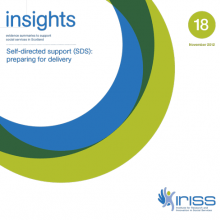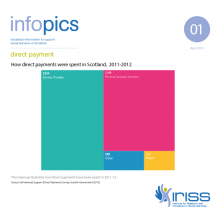Summary
This summary looks at how the social care workforce in Scotland can be further developed to deliver self-directed support. In the literature reviewed, there was limited shared knowledge about successful staff training and development to support personalisation, despite an emphasis in several Scottish Government reports on the importance of sharing good practice. The suggested approaches in this summary are involving service users in SDS training; person-centred practice; and further developing workforce understanding of the processes of personalisation. This document also highlights the barriers experienced by the workforce in making the shift towards personalisation.
Introduction
This evidence summary seeks to address the following question:
How can the social care workforce in Scotland be further developed to deliver self-directed support?
About the evidence presented below
We drew on a wide range of evidence, including academic research in the fields of social work in relevant databases (e.g. ASSIA, ProQuest Public Health Database, SCIE Social Care Online, etc.), on Google Scholar, as well as as the websites of key organisations (e.g. Community Care, Centre for Welfare Reform, etc.) and reports produced by the Scottish Government.
A large amount of the evidence on self-directed support (SDS) in Scotland was produced during the pilot period from 2009-2011 and in the lead-up to implementation in 2014. In order to identify effective strategies for workforce development, this review was focused on post-implementation reporting, with most of the information reviewed limited to the last five years. Most of this is concentrated on the UK context, however several studies from Australia and Europe are also included.
We found more grey literature than academic research addressing personalisation, which may raise concerns about the degree of rigour in the evidence base for policy and practice in this area. There was also a strong focus on the user experience, in line with the ethos of SDS, however this made it difficult to identify effective training interventions for frontline staff. In the literature reviewed, there was limited shared knowledge about successful staff training and development to support personalisation, despite an emphasis in several Scottish Government reports on the importance of sharing good practice.
Accessing resources
We have provided links to the materials referenced in the summary. Some of these materials are published in academic journals and are only available with a subscription through the The Knowledge Network with an NHSScotland OpenAthens username. The Knowledge Network offers accounts to everyone who helps provide health and social care in Scotland in conjunction with the NHS and Scottish Local Authorities, including many in the third and independent sectors. You can register here. Where resources are identified as ‘available through document delivery’, these have been provided to the original enquirer and may be requested through NHS Scotland’s Fetch item service (subject to eligibility).
Background
Self-directed support (SDS) is the Scottish Government’s chosen method to ensure that each individual’s right to choice is delivered through a shift in approach within the social care system. However, Dalrymple et al. 2017 argue that SDS should focus on the impact of service structures for the workforce as well as service users, because human rights outcomes cannot be delivered to the public at a cost to the rights and dignity of workers. Research indicates that the workforce experience number of barriers in making the shift towards personalised support. These include:
- problems related to rapid and unscheduled changes in rotas;
- incidents of ‘forced availability’;
- health and wellbeing implications, including clashes with work-life balance;
- fragmentation of work;
- and exacerbation of already difficult recruitment and retention issues within the sector (Eccles and Cunningham 2016).
Within the broader European context, Ranci and Pavolini (2015) state that reforms in the last two decades have contributed to the deterioration of working conditions and weakened the professional quality of long-term care services, mainly attributed to the introduction of freedom of choice principles in care delivery and the consequent reduction in the autonomy of social workers. Lymbery (2014) notes there are also practical issues that personalisation fails to address, with the most notable being limited and inadequate resources, particularly during a period of major cuts to public expenditure.
In addition to these challenges, there are problems in identifying the necessary training to support the development of the unique skills required to fully implement SDS (Eccles and Cunningham 2016). While the evidence underlines the importance of training for frontline workers (such as Audit Scotland 2017 and Disability Reform Council 2015), there is little reporting on what is being offered and whether the desired outcomes are being achieved. In Australia, for example, there was a call for the government to support the development of training and to fund analysis of skills requirements to support personalisation (Disability Reform Council 2015), but no further detail is currently available. Prior to the introduction of SDS, service providers expressed concern about the risk of investing in staff training and infrastructure if services were destabilised (Scottish Government 2012), however the available evidence does not indicate if this occurred. The Scottish Government provides the Support in the Right Direction (SIRD) fund, supporting a number of projects offering social work staff training on self-directed support (Scottish Government 2018). This involves client group-focused awareness training for frontline staff, consistent with the needs identified by Dalrymple et al. (2017) for sensitivity training around specific client groups, namely those with mental health conditions, people living with homelessness, people with a criminal record, people over 65, people with dementia and people in residential care. However, some SIRD projects have reported difficulties in getting social work to engage, which is thought to be related to the number of competing training opportunities being offered to local authorities (Scottish Government 2018).
The evidence surrounding evaluations of SDS training is sparse and, like other areas of training social care, has been dominated by concerns on take-up rather than impact. In a paper examining the transfer of training in adult social care, Clarke (2013) found limited evidence for the impact of training on changing practice, despite the policy of increasing personalisation having been accompanied by investment in workforce training and development. There is fairly scant knowledge of the best mix of activity, type of instruction and optimum duration of a training programme for in-service training. It is thought that the work environment influences the effectiveness of training, particularly the role of the supervisor to set clear and specific goals, as well as the alignment of training with organisational procedures and policies.
Evidence
Gardner (2012) developed a curriculum for personalisation that recommends social work students critically engage with personalisation as both an ideology and as a way of delivering services. Some of the key topics identified in this curriculum are:
- the inclusion of service user and carer perspectives in training;
- person-centred practice and outcome-focused reviews;
- and processes of personalisation, including understanding of self-assessments, eligibility criteria, resource allocation systems, and support planning.
These topics are consistent with the core a set of principles and values highlighted by Dalrymple et al. (2017) which are: involvement; collaboration; and fair choice. The following evidence is therefore divided into these three themes, drawing primarily from literature related to personalisation. As there is limited reporting on the outcomes of SDS training, we have also included papers from the field of social work education. In addition to this, we have included a section of examples of online SDS training for frontline practitioners.
Involvement
The Social Care (Self Directed Support) (Scotland) Act 2013 requires that the person receiving support must have as much involvement as they wish in both the assessment and in the provision of any assistance (Dalrymple et al. 2017), there may therefore be a case to be made for including service users in SDS training, particularly to promote understanding of specific client groups. Levy et al. (2016) state that in social work education, a broader lens on knowledge is required that isn’t confined to ‘expert’ knowledge, but embraces and utilises experiential knowledge that is inclusive of marginalised and silent voices, and involving service users in training is one way of achieving this. The follow provides examples of how services users can be involved in training.
Hitchin, S (2016) Role-played interviews with service users in preparation for social work practice: exploring students’ and service users’ experience of co-produced workshops, Social Work Education, 35(8), pp.970–981. (Available with NHS Scotland OpenAthens username)
Six services users and 30 social work students participated in role-play scenarios, where they alternately took on the role of service user, social worker and observer. Students completed anonymous evaluation forms, with 100% of respondents indicating they had learned something, however there was wide variation in what they had learned. Service users also completed anonymous evaluation forms and provided verbal and written feedback. They indicated that participation had been a positive experience, particularly for developing self-esteem, however the authors of this study note that this type of engagement with students is significantly more demanding of service users than traditional forms of involvement, such as sharing personal stories, and appropriate preparation and support is vital.
Eccles, A and Cunningham, I (2016) The enablers and barriers to voluntary sector organisations providing personalised support through delivery of self-directed support. (pdf)
This research included a survey of five hundred personnel across all aspects of voluntary sector provision conducted via an online questionnaire, interviews with staff in voluntary sector organisations and focus groups with service users. 48% of respondents surveyed from the voluntary sector reported an increase in training focused on personalisation, with three-quarters of respondents reporting involving people who use services and their families in influencing training priorities.
The existing activities around frontline staff development identified in this study include:
- undertaking skills audits,
- training initiatives in risk taking,
- and using people who use services and their families to either influence training priorities or as facilitators of training delivery.
Levy, S et al. (2016) Outcomes focused user involvement in social work education: applying knowledge to practice, Social Work Education, 35(8), pp.866–877. (Available with NHS Scotland OpenAthens username)
This paper reports on the narratives emerging from longitudinal data collected from 2012-2015 covering 90 students’ participation in a core social work module where they spend 15 hours with a service user and/or carer. Themes of communication, information and relationships emerged for students, however service users talked of feeling distant and removed from the decision-making process. The authors warn there is a risk that involving service users in training may appear tokenistic and lack meaningful outcomes. Recent data shows a shift towards students accessing information that will assist service users and carers to make decisions about activities that are more holistic than narrowly defined social care services, which is thought to be connected with the current policy discourse of personalisation and outcomes-based approaches.
Scotland’s National Action Plan for Human Rights (2016) Human rights in health and social care - putting it into practice : case studies from Scotland. (pdf)
This report provides several case study examples on how service users have been involved in embedding a human rights based approach in organisations. This includes the following projects:
- Users of mental health services are involved in training for mental health officers as a part of the HUG (action for mental health) Communications Project.
- Scottish Care worked with residents and staff of care homes to collectively develop the Convention on the Rights of Residents in Care Homes.
Collaboration
One of the barriers to successful implementation of SDS frequently identified in recent evidence is the difficulties frontline staff face in successfully collaborating with service users and carers to develop outcomes for their support plans (Audit Scotland 2017; Eccles and Cunningham 2016). Not only is there a need for workforce training to support the understanding of an outcomes-focused approach (Audit Scotland 2017), further development of skills in facilitation and communication may help increase collaboration with social workers and service users.
Audit Scotland (2017) Self-directed support : 2017 progress report. (pdf)
This report found there is no evidence that authorities have yet made the transformation required to fully implement the SDS strategy. A survey of social work staff found many were positive about the principles of personalisation and SDS, but a significant minority lacked understanding or confidence about focusing on people’s outcomes, with concerns that outcomes weren’t being used to help develop individuals’ support plans. Similarly, in third-sector organisations, the most common and pressing skills shortage among their staff is a lack of understanding of outcomes. The report highlights the need for local authorities to provide staff with further training for and help on identifying and planning for outcomes.
Jacobs, S et al. (2013) The personalisation of care services and the early impact on staff activity patterns, Journal of Social Work, 13(2), pp.141–163. (Available with NHS Scotland OpenAthens username).
This study examines the early impact on care coordinators’ work activity patterns of implementing personalisation in England, with 249 participants completing a self-administered diary schedule, including teams directly involved in delivering individual budgets and those not involved in pilots. Data were supplemented with semi-structured interviews with 48 care coordinators and 43 team managers. Individual budgets were piloted differently in different local authorities, so there was unavailability of a true control’ versus ‘intervention’ comparison in this research. The findings indicate that those involved in delivering individual budgets experienced a shift towards more time with service users, in particular around support planning activities. This change in the nature of social work - referred to as a ‘return to social work roots’ in the paper - may create a need for training to address facilitation and collaboration skills.
Pearson, C, et al. (2017) Changing the culture of social care in Scotland: has a shift to personalisation brought about transformative change?, Social Policy & Administration, pp. 1–15. (Open Access)
The authors in this study sent out two FOI requests to all 32 Scottish local authorities. In 2015, 26 local authorities replied, with 22 providing full information, and in 2016, 23 replied, with 22 willing to provide the full information on the questions asked. The findings indicate that the focus on partnership and co‐production in the sector appears to be a major challenge for policy implementation. Local authorities cite several explanations for this: failure of staff to offer choice to care users; lack of understanding of SDS amongst frontline staff; and the reluctance of frontline staff to engage with co-production. The authors state that achieving meaningful user engagement still remains a problem in SDS.
Fair choice
In the 2017 Audit Scotland SDS progress report, a number of service users and carers said there was a lack of information and support to help understand SDS. The report recommends training for frontline workers to better support the information needs of people using social care services. In the Australian context, social workers play an important role in the brokerage of information (Carey et al. 2017) and Smith and Brown (2018) state that organisations offering individual service funds need capacity to support people to plan creatively using their individual budgets.
Community Care (2013) The state of personalisation (webpage)
Community Care conducted a survey of social workers in England to identify priorities in the implementation of personalisation. While these results are over five years old and the landscape may have changed, respondents identified three skill areas where they needed more training, all revolving around their ability to support fair choice. These were: helping users build personal and community networks; knowledge about local support available to help services users manage personal budgets; and knowledge about care and support services available locally, including non-traditional services.
Health and Social Care Alliance Scotland (2017) Personal experiences of self-directed support. (pdf)
This report presents the findings of a small-scale, mixed methods research project into people’s personal experiences of SDS, which involved a rapid desk-based inquiry into existing research, followed by an online survey and focused one-to-one interviews with service users. These findings show that experiences of SDS are very varied, with inconsistencies in messages and understanding about what SDS can or cannot be used for and how it can be managed. A large proportion of people in receipt of SDS in Scotland may not feel that the information provided to them supports their decision-making progress. For example, about one third of respondents who identify as having a mental health issues had not had a discussion about SDS with a social worker, with some claiming their local department was resistant or obstructive when asked for information. Respondents who had discussed SDS with their social worker indicated greater knowledge than those who had not, demonstrating the need for social workers to develop and share their knowledge.
Examples of training
NHS Education for Scotland (no date) Introduction to self-directed support (website)
This is a freely available e-learning resource providing a brief introduction to the concept of SDS, as well as an overview of the four options and two case studies. The module ends with a brief quiz to test the knowledge of participants, with links to further reading and the option to apply for an OpenBadge through the SSSC. Some of these links are out of date, so the information may not be current.
Open University (2013) Foundations for self-directed support in Scotland (website)
This free-access 60 hour online foundation course on personalisation and support was developed with support from the Scottish Government. It provides a comprehensive overview of the history of personalisation, co-production, outcomes-based thinking, and personalisation and risk. The course also brings together a wide range of evidence about SDS and provides multiple viewpoints, however as it has not been updated since 2014, it lacks information about SDS post-implementation in Scotland.
Shelter Scotland (no date) Self-directed support for housing support practitioners (website)
Shelter Scotland offers a free 2 hour e-learning course consisting of 4 interactive modules. The aim of this training is to provide participants with the knowledge and capability to support individuals to make informed and sustainable self-directed support choices. It covers issues around housing, homelessness, housing support and the applications of SDS to these areas.
References
Audit Scotland (2017) Self-directed support : 2017 progress report. (pdf)
Carey, G. et al. (2017) Redressing or entrenching social and health inequities through policy implementation? Examining personalised budgets through the Australian National Disability Insurance Scheme, International Journal for Equity in Health, 16(1), pp.1–12. (Open Access)
Clarke, N (2013) Transfer of training: the missing link in training and the quality of adult social care, Health and Social Care in the Community, 21(1), pp.15–25. (paywalled)
Community Care (2013) The state of personalisation (webpage)
Dalrymple, J, Macaskill, D. and Simmons, H (2017) Self-directed support: your choice, your right. (pdf)
Disability Reform Council (2015) Integrated market, sector and workforce strategy. (pdf)
Eccles, A and Cunningham, I (2016) The enablers and barriers to voluntary sector organisations providing personalised support through delivery of self-directed support. Edinburgh: Providers and Personalisation, CCPS (pdf)
Gardner, A (2012) Curriculum guide - personalisation. (pdf)
Health and Social Care Alliance Scotland (2017) Personal experiences of self-directed support. (pdf)
Hitchin, S (2016) Role-played interviews with service users in preparation for social work practice: exploring students’ and service users’ experience of co-produced workshops, Social Work Education, 35(8), pp.970–981. (paywalled)
Jacobs, S et al. (2013) The personalisation of care services and the early impact on staff activity patterns, Journal of Social Work, 13(2), pp.141–163. (paywalled).
Levy, S et al. (2016) Outcomes focused user involvement in social work education: applying knowledge to practice, Social Work Education, 35(8), pp.866–877. (paywalled)
Lymbery, M (2014) Understanding personalisation: implications for social work, Journal of Social Work, 14(3), pp.295–312. (paywalled)
NHS Education for Scotland (no date) Introduction to self-directed support (website)
Open University (2013) Foundations for self-directed support in Scotland (website)
Pearson, C, Watson, N and Manji, K (2017) Changing the culture of social care in Scotland: has a shift to personalisation brought about transformative change?, Social Policy and Administration, pp. 1–15. (Open Access)
Ranci, C and Pavolini, E (2015) Not all that glitters is gold: long-term care reforms in the last two decades in Europe, Journal of European Social Policy, 25(3), pp.270–285. (paywalled)
Scotland’s National Action Plan for Human Rights (2016) Human rights in health and social care - putting it into practice : case studies from Scotland. (pdf)
Scottish Government (2012) Self-directed Support Bill: explanatory notes. (pdf)
Scottish Government (2018) Review of independent information and support services funded by the Scottish Government. (pdf)
Shelter Scotland (no date) Self-directed support for housing support practitioners (website)
Smith, S and Brown, F (2018) Individual service funds: a guide to making self-directed support work for everyone. Centre for Welfare Reform. (pdf)





